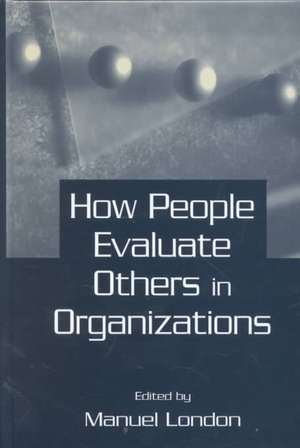How People Evaluate Others CL: Towards an Information Society for All, Volume 3: Applied Psychology
Editat de Manuel Londonen Limba Engleză Hardback – 12 mai 2001
This book examines the social psychological dynamics of person perception that underlie how people evaluate others in organizations. It contains original articles from leading experts in social, industrial, and organizational psychology. The book begins by examining basic principles and processes of social cognition and person perception, such as schemas, stereotypes, automatic/mindless information processing, the perceiver's motivation and affect, and situational conditions. It then applies these ideas to key areas of business operations.
Helping readers understand and develop ways to improve the way people assess and make decisions about others, this book:
* covers the interview, executive promotion decisions, and assessment centers;
* examines performance appraisals and multisource (360 degree) feedback ratings;
* addresses leadership cognitions, identifying training needs, coaching, and managing problem employees; and
* includes chapters on cultural sensitivity, negotiations, group dynamics, and virtual teams.
Preț: 954.99 lei
Preț vechi: 1164.62 lei
-18% Nou
Puncte Express: 1432
Preț estimativ în valută:
182.76€ • 188.80$ • 152.10£
182.76€ • 188.80$ • 152.10£
Carte tipărită la comandă
Livrare economică 26 martie-09 aprilie
Preluare comenzi: 021 569.72.76
Specificații
ISBN-13: 9780805836110
ISBN-10: 080583611X
Pagini: 424
Dimensiuni: 162 x 236 x 28 mm
Greutate: 0.72 kg
Ediția:New.
Editura: Psychology Press
Seriile Applied Psychology, Applied Psychology (Hardcover)
ISBN-10: 080583611X
Pagini: 424
Dimensiuni: 162 x 236 x 28 mm
Greutate: 0.72 kg
Ediția:New.
Editura: Psychology Press
Seriile Applied Psychology, Applied Psychology (Hardcover)
Textul de pe ultima copertă
Evaluating and making decisions about other people are key aspects of doing business, especially for managers and human resource professionals. Industrial and organizational psychologists devise systematic methods to remove human errors in judgment, such as biases and stereotypes. However many decisions about people are not made by experts using standard procedures. Even when they are, human judgment is unavoidable.
This book examines the social psychological dynamics of person perception that underlie how people evaluate others in organizations. It contains original articles from leading experts in social, industrial, and organizational psychology. The book begins by examining basic principles and processes of social cognition and person perception, such as schemas, stereotypes, automatic/mindless information processing, the perceiver's motivation and affect, and situational conditions. It then applies these ideas to key areas of business operations.
Helping readers understand and develop ways to improve the way people assess and make decisions about others, this book:
* covers the interview, executive promotion decisions, and assessment centers;
* examines performance appraisals and multisource (360 degree) feedback ratings;
* addresses leadership cognitions, identifying training needs, coaching, and managing problem employees; and
* includes chapters on cultural sensitivity, negotiations, group dynamics, and virtual teams.
This book examines the social psychological dynamics of person perception that underlie how people evaluate others in organizations. It contains original articles from leading experts in social, industrial, and organizational psychology. The book begins by examining basic principles and processes of social cognition and person perception, such as schemas, stereotypes, automatic/mindless information processing, the perceiver's motivation and affect, and situational conditions. It then applies these ideas to key areas of business operations.
Helping readers understand and develop ways to improve the way people assess and make decisions about others, this book:
* covers the interview, executive promotion decisions, and assessment centers;
* examines performance appraisals and multisource (360 degree) feedback ratings;
* addresses leadership cognitions, identifying training needs, coaching, and managing problem employees; and
* includes chapters on cultural sensitivity, negotiations, group dynamics, and virtual teams.
Cuprins
Contents: E.A. Fleishman, Series Foreword. Preface. Part I:Social Cognition and Person Perception. R.J. Klimoski, L.M. Donahue, Person Perception in Organizations: An Overview of the Field. D. Operario, S.T. Fiske, Causes and Consequences of Stereotypes in Organizations. Part II:Selection. C.K. Parsons, R.C. Liden, T.N. Bauer, Person Perception in Employment Interviews. V.I. Sessa, Executive Promotion and Selection. P.R. Sackett, K.A. Tuzinski, The Role of Dimensions and Exercises in Assessment Center Judgments. Part III:Appraisal. J.L. Barnes-Farrell, Performance Appraisal: Person Perception Processes and Challenges. M.K. Mount, S.E. Scullen, Multisource Feedback Ratings: What Do They Really Measure? Part IV:Developmental Processes. D.J. Brown, R.G. Lord, Leadership and Perceiver Cognition: Moving Beyond First Order Constructs. K. Kraiger, H. Aguinis, Training Effectiveness: Assessing Training Needs, Motivation, and Accomplishments. J.W. Smither, S.P. Reilly, Coaching in Organizations. Z. Strassberg, Understanding, Assessing, and Intervening With Problem Employees. Part V:Interpersonal Interactions. S. Raghuram, Cultural Frames and Values Affecting Employment Practices. J.T. Casey, Frame Attribution and Positional Framing in Negotiation. S.M. Fiore, E. Salas, J.A. Cannon-Bowers, Group Dynamics and Shared Mental Model Development. B.J. Avolio, S. Kahai, R. Dumdum, N. Sivasubramaniam, Virtual Teams: Implications for E-Leadership and Team Development. M. London, Conclusion: Toward a Comprehensive Understanding of Person Perception in Organizations.
Descriere
This edited book by leaders in the field of Management & Social Psychology applied current theory and research in social cognition to assessments used in personnel selection, appraisal, & development. Key areas like teamwork, negotiations,

